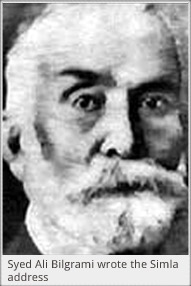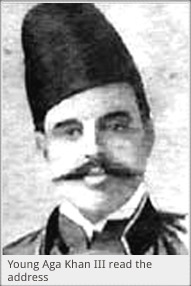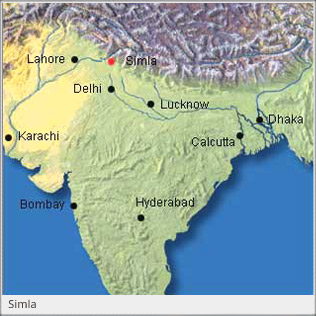When Lord Minto was appointed as the Viceroy on India in 1905, new reforms were indicated in which the elected principle would be extended. The anti-partition agitation had convinced the Muslims of the futility of expecting any fair-play from the Hindu majority. Therefore, to safeguard their interests, the Muslim leaders drew up a plan for separate electorates for their community, and presented it to the Viceroy Lord Minto at Simla, on October 1, 1906.
 Mr. Bilgrami wrote the text of the plan. The Simla Deputation consisted of 70 representatives, representing all opinions of the Muslim community, and headed by Sir Aga Khan who read the address. The long address said, among other things, that the position of the Muslim community should not be estimated by its numerical strength alone, but in terms of its political importance and services rendered to the Empire. He also pointed out that the representative institutions of the West were inappropriate for India and that their application was raising difficult problems. He stressed the need of utmost care while introducing or extending the electoral system in whatever sphere, be it municipal or provincial. He stated that the Muslims should be represented as a community.
Mr. Bilgrami wrote the text of the plan. The Simla Deputation consisted of 70 representatives, representing all opinions of the Muslim community, and headed by Sir Aga Khan who read the address. The long address said, among other things, that the position of the Muslim community should not be estimated by its numerical strength alone, but in terms of its political importance and services rendered to the Empire. He also pointed out that the representative institutions of the West were inappropriate for India and that their application was raising difficult problems. He stressed the need of utmost care while introducing or extending the electoral system in whatever sphere, be it municipal or provincial. He stated that the Muslims should be represented as a community.
The Viceroy in his reply to the Simla Deputation address reassured the Muslims that their political rights and interests as a community would be safeguarded by any administrative reorganization under him.
 The acceptance of the Deputation’s demands proved to be a turning point in the history of the Sub-continent. For the first time, the Hindu-Muslim conflict was raised to the constitutional plane. The Muslims made it clear that they had no confidence in the Hindu majority and that they were not prepared to put their future in the hands of an assembly elected on the assumed basis of a homogenous Indian nation. It is in this sense that the beginning of separate electorate may be seen as the beginning of the realization of the Two-Nation Theory, its final and inevitable consequence being the partition of British India in 1947.
The acceptance of the Deputation’s demands proved to be a turning point in the history of the Sub-continent. For the first time, the Hindu-Muslim conflict was raised to the constitutional plane. The Muslims made it clear that they had no confidence in the Hindu majority and that they were not prepared to put their future in the hands of an assembly elected on the assumed basis of a homogenous Indian nation. It is in this sense that the beginning of separate electorate may be seen as the beginning of the realization of the Two-Nation Theory, its final and inevitable consequence being the partition of British India in 1947.
The Simla Deputation was successful because the Muslims were strongly urged to protect their separate identity, whereas the British responded to their demands, as Lord Minto was anxious to pull them out of their political discontent.

Separate electorates were given statutory recognition in the Indian Councils Act of 1909. Muslims were accorded not only the right to elect their representatives by separate electorates, but also the right to vote in general constituencies. In addition, they were also given weightage in representation.
This article was last updated on Sunday, June 01, 2003






